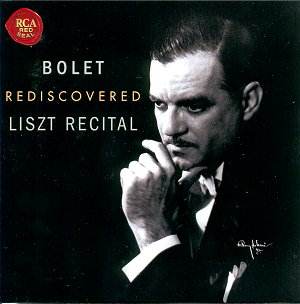BOLET Rediscovered LISZT Recital
Franz LISZT (1811-86) Liebestraum,
S541 No. 1. Trois Etudes de concert, S145. Harmonies poétiques et
réligeuses - No. 7, Funérailles. Grands Etudes de Paganini,
S140 - No. 3, La campanella. Grand Galop chromatique, S219. Rhapsodie espagnole,
S254. WAGNER/LISZT Tannhaüser
Overture.
 Jorge Bolet (piano).
Jorge Bolet (piano).
Recorded in RCA Studio A, New York on August
22nd-24th, 1972 and July 16th, 1973
(Tannhaüser Overture).
 RCA Red Seal 09026
63748-2 [ADD]
[52'23]
RCA Red Seal 09026
63748-2 [ADD]
[52'23]
Crotchet AmazonUK
AmazonUS
Amazon
recommendations

Bolet played in the Grand Tradition of pianists such as Godowsky and Rosenthal.
Of all the composers whose music he presented in recital, he seemed particularly
close to the music of Franz Liszt. His singing, legato cantabile,
his refusal to make an ugly sound and, most of all, his conviction that Liszt's
music is truly great (and that mere empty virtuoso show is for lesser mortals)
all contributed to the special force of his performances. Anyone who was
privileged to hear him live would testify to his passionate devotion to the
cause of the Romantic movement.
Jon M. Samuels, in his booklet note to this release, outlines the history
of the present recital. Apparently Bolet was due to record enough for a multi-LP
issue, which never saw the light of day, until Samuels discovered the rejected
tracks last year.
And this is a gem of a Liszt recital, recommendable not only to
pianophiles, but to all lovers of the Romantic period. The Liebestraum
No. 3 (a Bolet favourite on the concert platform and in the recording studio)
is characterised by a singing, almost vocal line and an incredibly sensitive
rubato. As it reaches its climax, there is not so much as a hint of Bolet's
straining his tone. There are so many recordings of this piece in the catalogue
as to make comparison impossible: especially as Bolet makes the listener
believe at the time that his way is the only way.
This supreme cantabile returns to enchant in Un sospiro, the third
of the Etudes de Concert, S144. Similarly, in the extended
Funérailles, Bolet rises supremely to the lyric challenge.
He seems almost to narrate the long, lyrical lines (whichever register the
theme happens to occur in), simultaneously being possessed of a complete
grasp of the structural shape, so that the tremendously large sonorities
of the climax are almost overbearing in their impact. The full tone he possessed
gives a sense of the highest integrity to this moment. His account can easily
be spoken of in the same breath as those by Ogdon, Arrau and Berman.
The inclusion of the virtuoso Grand Galop chromatique, S219 is ingenious.
Bolet treats this often-abused piece with the greatest respect and as a result
his reading has real integrity. The peroration, which can sound crass, seems
perfectly natural here. The Rhapsodie espagnole, S254 which follows
acts as a summation of Bolet's credentials as a Lisztian. This is stunning
pianism that never overwhelms but rather enhances the musical content. By
the close, one really does feel like applauding: which has the happy bonus
of making the final item, the Wagner/Liszt Tannhäuser transcription,
seem like an encore.
There is another story linked to this: after a recording session on July
16th, 1973, Bolet played through this transcription on impulse.
The engineers (who were using two machines in tandem) managed to get a complete
performance together only by overlapping the recordings from the two machines.
This is an unedited account, and whilst there are some 'handfuls' along the
way, they only add to the spur-of-the-moment feel. What is equally remarkable
is the prayer-like atmosphere of the opening, immediately completely rapt
and full of concentration.
The quirky lengthening of the first of the group of triplets in the main
Tannhäuser theme is something I remember from a live performance
he gave in the Festival Hall some years back now. There again, the same
identification with Liszt's aesthetic was in evidence.
This is a wonderful disc.
Colin Clarke

